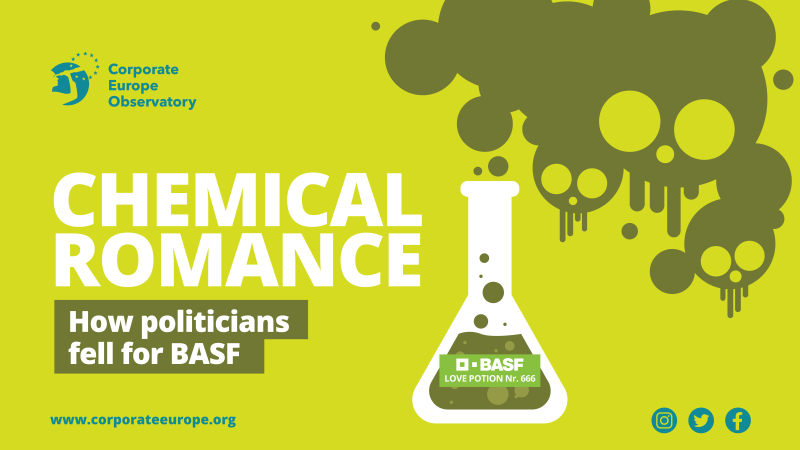Stay always informed
Interested in our articles? Get the latest information and analysis straight to your email. Sign up for our newsletter.

BASF is the world’s biggest chemical producer. This profile maps its political access, wider political connections, huge lobby budget, and networks of industry allies that have been its recipe for influencing success.
The European Commission has so far failed to publish its proposal to revise its flagship chemicals regulation - REACH. Meanwhile awareness about what toxic chemicals including PFAS (‘forever’ chemicals) are doing to our bodies and environments is growing.
As our new profile of BASF makes clear, ever since the plan to revise REACH was included in its 2020 chemicals strategy, the Commission has been bombarded with messages from the chemicals industry and centre-right MEPs to limit the scope of, or to postpone, REACH and other upcoming chemicals regulations. While the Commission now considers whether it can release its proposal in June, lobby watchdog Corporate Europe Observatory has released a company profile of the German chemicals giant BASF, and its close industry allies, shining a light on just how influential it is.
The intensity of the company’s lobbying - both in the EU and Germany - is obvious. BASF is high up in the league table of biggest company declared lobby spenders at the EU level, ranking number 12 with a €29.6 million+ EU lobby spend in the 2011-21 period and €3-€3.5 million spend for 2021 alone. A key element of BASF's influence is its network of industry allies. They provide extra platforms for BASF's well-connected Chief Executive, helping to amplify its messages and boost access to decision-makers.
So far President Ursula von der Leyen’s Commission has put the brakes on the REACH proposal until quarter 4 of 2023. But now pressure is building on von der Leyen and questions linger: will she listen to health and environmental arguments for the REACH revision to be published in June, or will industry get its way again? Will the proposal get kicked to the end of the year, when there is not enough time before the EU elections for MEPs and member states to properly consider it?
Vicky Cann, Researcher and Campaigner at Corporate Europe Observatory, said:
“On too many issues – REACH chemicals regulation, the climate crisis, economic ties with Putin’s Russia – BASF has been on the wrong side of history.
“Yet, politicians in Germany and in Brussels have drunk the BASF kool-aid. They have allowed its economic power within Germany’s export-led growth model to translate into political power.
“BASF’s political connections, the millions spent on lobbying, and an intensive network of industry allies who amplify its messaging and boost its access further, have been key to its influence.
“It’s time to kick climate and toxic polluters out of political decision-making.”
ENDS
For more information please contact:
Lucy Hall, Press Officer for CEO - lucy@corporateeurope.org / +44 7908 481895
Vicky Cann, Researcher for CEO - vicky@corporateeurope.org / +44 7960 988096
BASF’s record is deeply troubling with its portfolio of hazardous chemicals including persistent and “forever” chemicals (PFAS); its huge footprint of cancer-causing air pollution; its promotion of genetic engineering; its export of toxic pesticides to the global south; and its huge climate footprint and appetite for fossil fuels, to name just some concerns. And yet it demands public support for the transition to safer chemicals.
More key figures (from LobbyFacts.eu or from German lobby register, as of 9 March) include:
• With 19, BASF has more European Parliament access passes than any other company in the EU register, and since July 2019 has had at least 53 meetings with MEPs
• BASF has had 43 high-level meetings with the EU Commission since December 2014.
• In the EU register, 15 lobby consultancies and law firms have worked for BASF or its subsidiaries in 2011-21.
• Inconsistencies in BASF’s EU lobby register entry has led CEO to make a complaint this week.
• In Germany’s lobby register, BASF declared €3.85 million national lobby costs in 2021 and 24 lobbyists.
BASF’s recent financial results show a downturn in 2022 and it is planning 2600 job losses. But the value of its sales are up, shareholders will still get generous dividends, and a €10 billion investment in China is full steam ahead.